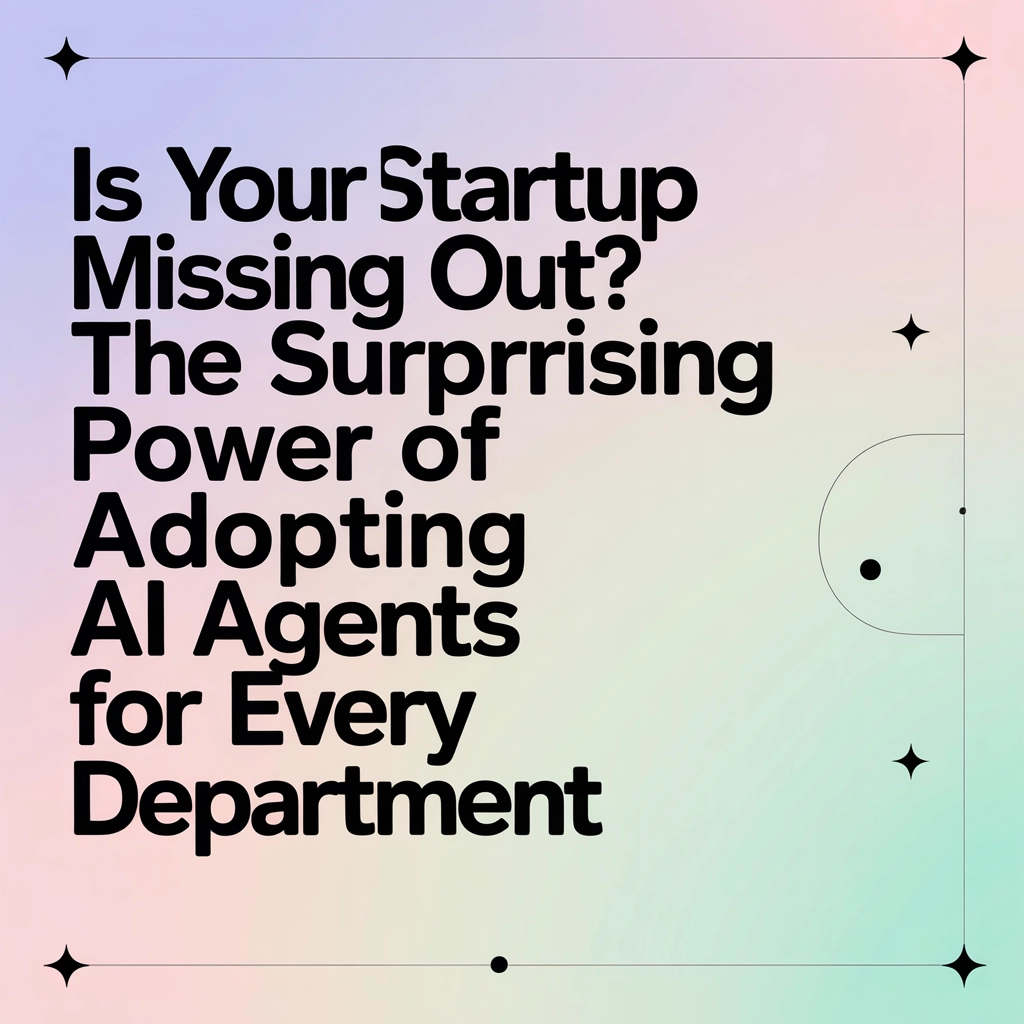Is Your Startup Missing Out? The Surprising Power of Adopting AI Agents for Every Department
Discover how startups are gaining competitive advantages by deploying specialized AI agents across all departments, from executive support to customer service and operations.

 🐾
🐾Is Your Startup Missing Out? The Surprising Power of Adopting AI Agents for Every Department

The most significant competitive advantage for startups in 2025 isn't a revolutionary product or massive funding—it's how efficiently your team operates. While you're reading this, your competitors are already deploying specialized AI agents across their organizations, automating routine tasks, accelerating decision-making, and freeing their human talent to focus on creative problem-solving and growth.
The question isn't whether AI can transform your business—it's whether you can afford to be the last startup in your industry to embrace this transformation.
The AI Agent Revolution: Beyond Chatbots and Simple Automation
Today's AI agents bear little resemblance to the clunky chatbots and limited automation tools of even two years ago. Modern AI agents are specialized, context-aware digital team members with distinct capabilities tailored to specific business functions.
"We're seeing a fundamental shift from general-purpose AI tools to specialized agents with deep expertise in particular domains," explains Dr. Marina Chen, AI Integration Specialist at Stanford's Business Technology Center. "The most successful startups are the ones treating these agents not as tools but as actual team members with specific roles."

The data backs this up. According to the 2025 Startup Technology Adoption Report, companies utilizing department-specific AI agents are experiencing:
- 32% higher productivity across teams
- 41% reduction in operational costs
- 28% faster time-to-market for new products and features
- 67% improvement in employee satisfaction with routine tasks
But what does this look like in practice? Let's explore how AI agents are transforming every department in today's fastest-growing startups.
The Executive Suite: Strategic Support and Decision Acceleration
For founders and C-suite executives, the most valuable resource isn't capital—it's time. Executive-focused AI agents are becoming indispensable for leaders who need to make high-quality decisions quickly while managing overwhelming information flows.
Modern executive AI agents can:
- Synthesize market research, competitor intelligence, and internal data into actionable insights
- Prepare comprehensive briefings before important meetings and negotiations
- Prioritize communications and flag critical issues requiring leadership attention
- Generate financial projections and scenario analyses in minutes instead of days
- Maintain strategic alignment by tracking OKRs and key initiatives across departments
Samantha Jones, founder of fintech startup PayCycle, attributes much of her company's rapid growth to her AI executive assistant: "Having an AI agent that understands our business model, keeps track of all our metrics, and prepares me for every meeting has essentially given me an extra 20 hours per week to focus on strategy and building relationships. It's like having a brilliant chief of staff who never sleeps."
Marketing & Sales: Personalization at Scale
The marketing and sales departments were early adopters of AI tools, but today's specialized agents go far beyond basic automation and chatbots.
Modern marketing and sales AI agents can:
- Generate and optimize multi-channel campaigns based on real-time performance data
- Create personalized content for different audience segments at unprecedented scale
- Perform sophisticated competitive analysis and identify market opportunities
- Qualify and nurture leads with human-like conversations that adapt to prospect responses
- Analyze sales calls to provide coaching and identify successful patterns
"Our marketing AI agent has transformed how we approach campaigns," says Miguel Sanchez, CMO at SaaS platform Dataflow. "It doesn't just execute our strategy—it actively contributes to it by identifying patterns and opportunities we would have missed. Last quarter, an insight from our AI agent led to a campaign that delivered 3x our typical conversion rate."
Content Creation: Beyond Basic Generation
While early AI content tools often produced generic material requiring heavy editing, today's specialized content agents are sophisticated collaborators in the creative process.
Advanced content AI agents can:
- Generate original, brand-aligned content across formats (blog posts, emails, social media, technical documentation)
- Adapt tone and style based on audience, platform, and business objectives
- Research topics thoroughly, including competitor content analysis
- Optimize content for SEO while maintaining natural, engaging writing
- Create and edit visual assets to complement written content

"Our content team was initially skeptical about AI assistance," admits Jordan Williams, Content Director at health tech startup Vitality. "Now they wouldn't work without it. Our writer AI agent has become a collaborator that handles the heavy lifting of research and first drafts, allowing our human team to focus on strategy and creative direction. We've increased our content output by 300% while actually improving quality metrics."
Customer Support: Empathy at Scale
Customer support has evolved dramatically with specialized AI agents that combine technical problem-solving with emotional intelligence.
Today's support AI agents can:
- Resolve up to 85% of customer inquiries without human intervention
- Maintain consistent brand voice while personalizing interactions
- Identify emotional cues in customer communications and respond appropriately
- Proactively detect potential issues before customers report them
- Seamlessly escalate complex cases to human agents with full context
"Our support AI agent has transformed our customer experience," says Leila Patel, Customer Success Director at EdTech platform LearnLab. "It handles routine inquiries instantly, which our customers love, but more importantly, it recognizes when someone is frustrated and needs human touch. Our CSAT scores have increased by 18 points since implementation, and our support team now spends their time on complex, interesting problems instead of password resets."
Legal & Compliance: From Bottleneck to Enabler
Legal departments have traditionally been bottlenecks in fast-moving startups. Specialized legal AI agents are changing this dynamic by accelerating routine legal work while enhancing compliance.
Modern legal AI agents can:
- Draft, review, and analyze contracts and legal documents
- Maintain regulatory compliance across jurisdictions
- Generate privacy policies and terms of service
- Monitor intellectual property issues and potential infringements
- Create legal research briefs and case summaries
"Our legal AI agent has transformed our contract process," explains David Chen, General Counsel at supply chain startup LogisticsPro. "What used to take days now takes hours. For standard agreements, the AI handles everything from drafting to redlining to approval workflows. For complex deals, it prepares everything for my review, highlighting potential issues and suggesting alternatives. I can support our growth without expanding my team."
Operations & Finance: Efficiency Engines
Behind every successful startup is an operations team making things work smoothly. AI agents are revolutionizing these critical but often overlooked functions.
Advanced operations and finance AI agents can:
- Automate accounts payable/receivable processes with 99.7% accuracy
- Optimize inventory management and supply chain logistics
- Prepare financial reports and forecasts
- Identify cost-saving opportunities across the business
- Manage complex project timelines and resource allocation
"Our operations AI agent paid for itself in the first month," reports Alex Thompson, COO at D2C brand EcoHome. "It identified billing errors and process inefficiencies that were costing us thousands each month. Now it manages our entire procurement process, handles vendor communications, and gives us predictive insights about potential supply chain issues before they impact production."
Implementation: Starting Your AI Agent Journey
The benefits are clear, but how do startups begin implementing AI agents across departments? The most successful approaches follow these principles:
- Start with pain points: Identify the most time-consuming, repetitive tasks in each department
- Choose specialized over general: Select AI agents designed specifically for your target functions
- Integration is essential: Ensure your AI agents can access the data and systems they need
- Human-AI collaboration: Design workflows where humans and AI complement each other
- Measure and optimize: Track clear KPIs before and after implementation

"The biggest mistake we see is companies treating AI implementation as a pure technology project," warns Raj Patel, founder of AI consultancy FutureFirm. "The most successful deployments treat it as a team transformation, with careful attention to how human and AI teammates will work together. When done right, we typically see 5-10x ROI within the first year."
The Real-World Impact: Startups Transformed by AI Agents
The impact of comprehensive AI agent adoption is perhaps best illustrated by looking at real-world examples:
Cirrus Health, a telemedicine startup, credits its AI agent team with enabling 400% growth without proportional increases in headcount. Their AI agents handle everything from patient scheduling to medical transcription to insurance verification, allowing their human team to focus on patient care.
GreenTech Solar deployed specialized AI agents across their entire operations, from sales to installation planning to customer support. CEO Maria Rodriguez reports: "We're operating with the efficiency of a company five times our size. Our competitors can't understand how we're able to deliver projects faster and at better margins with a team half their size."
DataSecure, a cybersecurity startup, uses AI agents to monitor threats, generate compliance documentation, and manage customer onboarding. "Our AI team members handle 70% of our operational workload," explains founder Jamal Washington. "That's allowed us to redirect our human talent to advanced threat research and product development—the things that actually differentiate us in the market."
The Future is Collaborative
The most forward-thinking startups aren't just using AI agents as tools—they're building integrated teams where humans and AI complement each other's strengths. This collaborative approach is creating entirely new possibilities for how companies operate and scale.
As we look toward 2026 and beyond, we're seeing the emergence of AI agent teams that collaborate not just with humans but with each other, passing tasks and information between specialized agents to solve complex business problems with minimal human intervention.
What's clear is that startups that embrace this transformation early will have a significant advantage. The productivity gains, cost savings, and enhanced capabilities provided by comprehensive AI agent adoption are too substantial to ignore. The question isn't whether your startup should adopt AI agents across departments—it's how quickly you can implement them before your competitors do.
The future belongs to companies that build the most effective human-AI teams. Is your startup ready to join them?
Want to learn more about how specialized AI agents can transform specific departments? Check out our detailed guides on AI for marketing teams, executive support, content creation, customer service, sales, and legal compliance.
 🐾
🐾